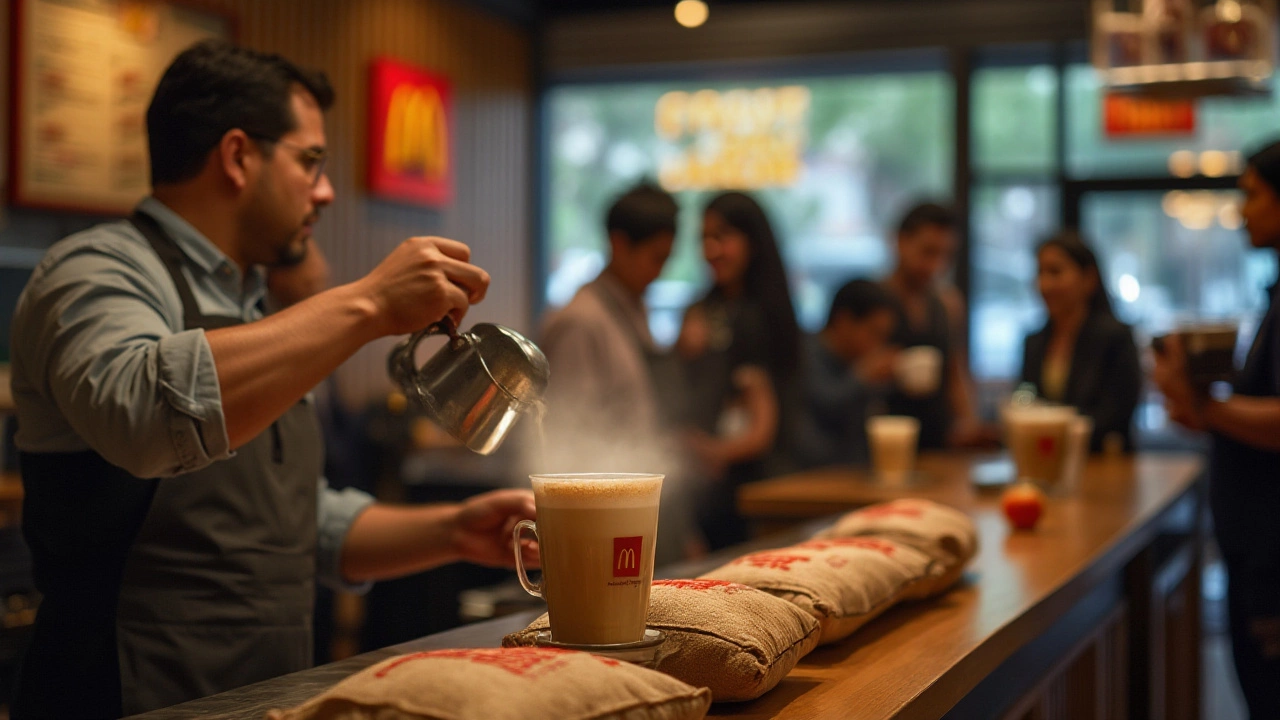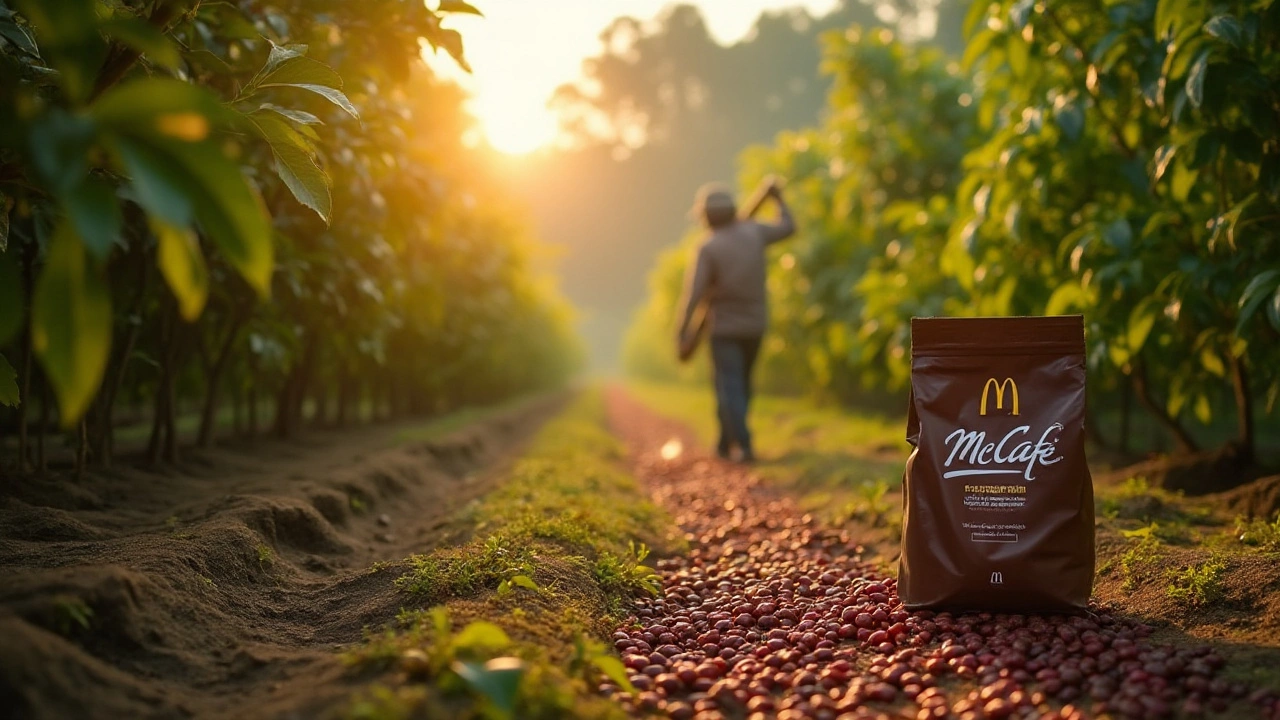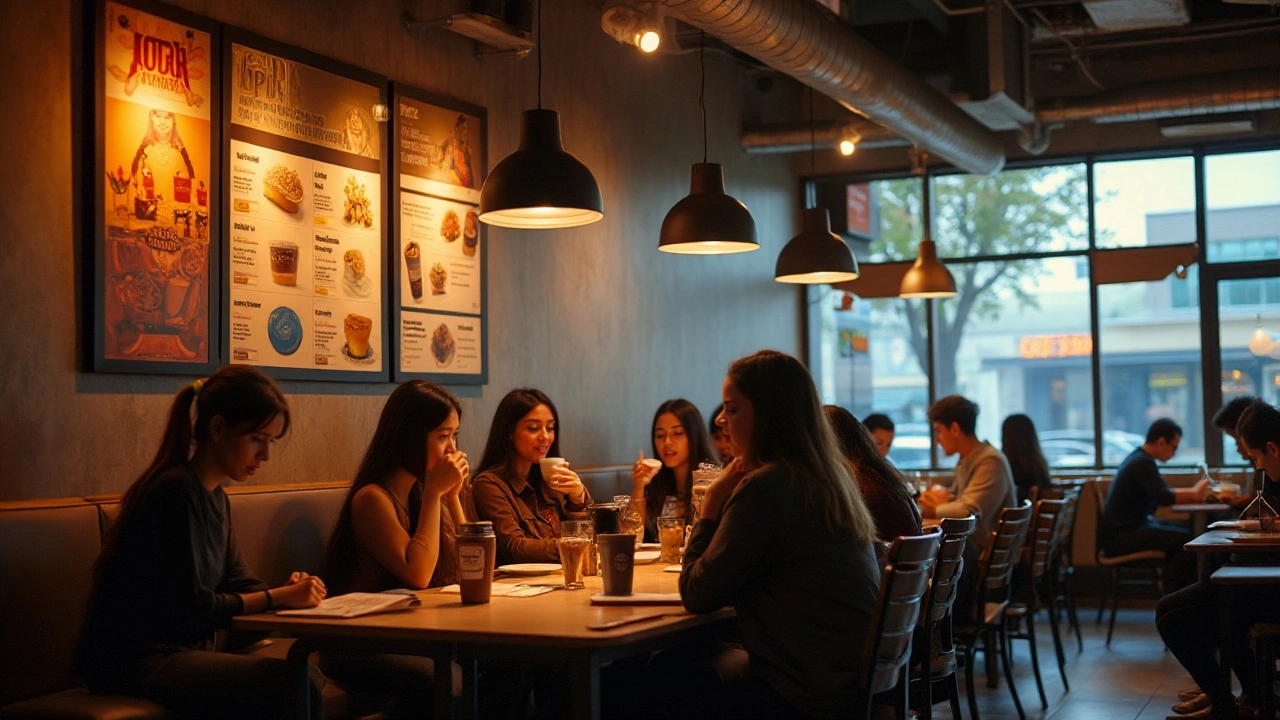
For those who find solace in a comforting cup of coffee, McDonald's coffee might just be a daily ritual. Known for its accessibility and consistency, the coffee served at the Golden Arches has managed to secure a loyal fanbase. But what exactly makes McDonald's coffee blend unique? Why do so many people love it?
McDonald's uses specially crafted blends to cater to a diverse range of tastes, predominantly featuring high-quality Arabica beans. These beans, known for their smooth and mild flavor, make for an ideal base to craft beverages that resonate with many.
In this exploration, we delve deeper into McDonald's coffee offerings, uncovering the secrets behind its consistently appealing taste. From the origins and sourcing practices to how you can attempt to replicate its charisma at home, this article paints a comprehensive picture of what makes McDonald's coffee a beloved choice for coffee enthusiasts across the globe.
- The Origins of McDonald's Coffee
- Understanding the Coffee Blend
- Sourcing and Quality Control
- The McCafe Experience
- Tips for Brewing McDonald's Coffee at Home
- Why McDonald's Coffee Stands Out
The Origins of McDonald's Coffee
The journey of McDonald's coffee from inception to the globally recognized brew it is today is nothing short of fascinating. It all began years ago when McDonald's saw the growing popularity of coffee culture and decided to make their mark. In the earlier days, McDonald's coffee was perceived as an afterthought, simply served alongside their breakfast items. However, recognizing the potential of coffee to elevate their customer experience, they embarked on a mission to refine their offering.
In the mid-2000s, the fast-food behemoth introduced the McCafe concept, a strategic move that would redefine not just their coffee offerings but also consumer perception. McCafe was not a standalone store but rather integrated within existing McDonald's locations, initially trialed in Australia before expanding globally. This venture into premium coffee was aimed at tapping into a burgeoning market and challenging established coffee giants like Starbucks.
McDonald's sought partnerships with renowned coffee suppliers to ensure they were delivering top-notch quality with every cup. The focus swiftly shifted to sourcing high-quality Arabica beans, which are known for their smooth, non-bitter taste. The choice of Arabica not only marked a departure from the traditional robusta beans often used by fast-food chains but also underscored McDonald's commitment to quality. To maintain this quality, rigorous standards were set in terms of bean sourcing, roasting, and brewing.
Over time, McDonald's coffee has grown to offer a variety of flavors and forms, from the standard drip coffee to more elaborate lattes and cappuccinos, available in different regions worldwide. The brand also adapted to different palates depending on the locale, ensuring that their McCafe offerings are culturally relevant and appealing. Interestingly, according to a public survey conducted in 2018, McDonald's coffee was ranked as one of the most preferred fast-food chain coffees in America, testament to their strategic vision and quality emphasis.
Food & Wine magazine once noted, "McDonald's leap into quality coffee offerings with McCafe has changed the fast-food coffee game forever."
As McDonald's continues to innovate and grow their coffee line, the origins of this endeavor serve as a reminder of how persistence, understanding consumer needs, and focusing on quality can transform a simple idea into a global phenomenon.
Understanding the Coffee Blend
When it comes to delivering a delightful coffee experience, McDonald's employs a specific strategy that combines knowledge, craftsmanship, and quality ingredients. The coffee et McDonald's goes beyond what one might expect from a fast-food joint, thanks in part to its strategic partnerships with established coffee producers. This blend predominantly consists of Arabica beans, celebrated for their inherent sweetness, mild acidity, and smooth finish. Arabica beans are particularly favored over the more robust Robusta variety, as they lend themselves to a palatable experience for the masses, which is precisely what McDonald's aims to deliver with every cup served. An interesting aspect of these beans is their source; they're often sourced from regions known for optimal growing conditions such as Brazil, Colombia, and Costa Rica, contributing to the nuanced taste profiles that many have come to appreciate.
This orchestrated selection ensures a consistently balanced flavor, which is key to McDonald's coffee success. The roasting process plays a crucial role here. By embracing a medium roasting technique, McDonald's hits the sweet spot where the beans' intrinsic flavors are retained while developing the caramel notes that coffee connoisseurs cherish. It's often said that the art of coffee roasting can make or break a blend's potential, and McDonald's seems to have perfected this art through years of refinement.
Maintaining such uniformity across thousands of locations worldwide is no small feat. The commitment to quality assurance can be seen in their meticulous testing and monitoring processes. According to a report by a reputable coffee industry consultant, "McDonald's has enforced a rigorous coffee quality control system to ensure that every cup meets their defined standards, providing a uniform experience to customers globally."
McDonald's elevates the humble coffee into a core brand strength by consistently meeting the high expectations of coffee enthusiasts. It's a testament to their dedication that one can rely on the predictability of their coffee experience regardless of location or time of day, ensuring customer satisfaction across the board.

Sourcing and Quality Control
At the heart of McDonald's coffee offerings is a commitment to sourcing high-quality beans that create the ideal balance of flavor and rich aroma. The journey of McDonald's coffee begins with selecting premium Arabica beans, known for their smooth, gentle profiles. These beans are sourced from various regions around the world, including Central and South America, where altitude and climate significantly contribute to the beans' quality. By collaborating with coffee growers who practice sustainable farming, McDonald's ensures a positive impact on the environment, supporting local communities and encouraging ethical practices.
Quality control is a defining aspect of how McDonald's maintains its coffee flavor consistently across numerous locations. Rigorous checks are a standard throughout the process, starting from the farm to the final cup served. Coffee beans undergo multiple rounds of testing for defects and taste, ensuring only the best make it into the blend. McDonald's employs a meticulous roasting process tailored to enhance the natural flavors of the beans. The uniformity achieved through these techniques means that whether you're enjoying a cup in New York or Tokyo, the experience remains familiar and satisfying.
Interestingly, McDonald's doesn't just stop at sourcing and quality control for its blend; they actively engage in initiatives that promote sustainable coffee production. This commitment is evident in their participation in the Global Coffee Platform, an organization dedicated to creating a more sustainable coffee sector. Such partnerships highlight McDonald's dedication to not only delivering quality but also fostering a responsible coffee industry. A quote from a recent report by the Global Coffee Platform emphasizes this commitment, "Sustainable coffee is not just about maintaining the supply chain, it's about improving the livelihoods of the people involved."
Studies often reflect that consumers can taste the difference between coffee sourced with care and those without. A survey conducted by the Specialty Coffee Association found that over 60% of coffee drinkers prefer brews made with sustainably sourced beans. This preference aligns with McDonald's strategy as they strive to appeal to a conscientious consumer base. By championing high standards and sustainability in their coffee production, McDonald's has not only cemented its place as a leader in the coffee market but also contributed positively to the global coffee-growing community.
The McCafe Experience
With its establishment in the late '90s, McCafe became McDonald's answer to the burgeoning coffee culture taking the world by storm. The concept was simple yet revolutionary for a fast-food giant: deliver a cafe-quality coffee experience at a fraction of the price and with the convenience that McDonald's is known for. Fast forward to today, and McCafe has expanded globally, becoming a standard fixture in locations across many continents. Catering to a more refined palette, McCafe offers a variety of coffee beverages using premium Arabica beans. Their coffee blend is crafted to offer a rich yet approachable flavor that meets different taste preferences, whether you're a fan of smooth lattes or robust espressos.
McCafe's success can largely be attributed to its commitment to quality and consistency. The team behind McCafe meticulously manages the entire coffee process, from the selection of beans to the final cup. This dedication ensures that each cup strikes the right balance — not too strong, not too weak. Plus, the affordability of McCafe's offerings allows for a broader audience to indulge in delightful coffee experiences. It's interesting to note that the idea behind McCafe aligns with the universal appeal of the McDonald's brand – creating an experience that is both reliable and enjoyable.
One might wonder what distinguishes McCafe from traditional coffee shops. The answer lies in its unique approach to convenience and consistency. Every McCafe beverage is prepared with a precise method, ensuring the signature taste is replicated in every cup served, whether you're in a bustling city or a quiet town. Using state-of-the-art coffee machines, each McCafe location is equipped to brew beverages efficiently without compromising quality. This streamlined process enables McDonald's to serve millions of McCafe drinks daily. A quote from a McDonald's spokesperson perhaps sums it up best:
"We are committed to bringing the same McCafe flavor experience to our customers, wherever they may be."
McCafe's array of options adds to its attractiveness. There's something for everyone, from bold espressos to creamy cappuccinos and even iced frappes for those who prefer their coffee cold. This variety not only attracts coffee aficionados but also occasional drinkers who appreciate the ease of having their preferred drink readily available. With an evolving menu that occasionally introduces limited-time offerings, McCafe keeps its selection refreshing and in tune with current trends.
While McCafe remains firmly rooted in the fast-food industry, its influence on everyday coffee consumption cannot be understated. It represents how innovation within a global brand can cater to and enhance consumer lifestyles. Whether you're grabbing your morning brew on your way to work or pausing for a leisurely sip in the afternoon, the convenience and quality of McCafe's coffee blend make it a trusted choice worldwide. Through its blend of accessibility and quality, McCafe sets itself apart as an exemplary modern coffee experience within reach of everyone.

Tips for Brewing McDonald's Coffee at Home
For those who crave the comforting embrace of a McDonald's coffee but enjoy the convenience of home brewing, replicating the taste can be a rewarding pursuit. It's a blend of art and science, involving a keen understanding of beans, water temperature, and brewing techniques. At its core, the coffee served at McDonald's hinges on the use of high-quality Arabica beans known for their smooth, mild flavor profile. These beans are medium-roasted to highlight their subtle sweetness and nutty undertones. While you won't have direct access to McDonald's proprietary roast, seeking out beans categorized as medium roast Arabica can serve as a strong foundation.
Start with freshly ground coffee; this is crucial as it retains the natural oils and aromas of the coffee bean itself, contributing to the desired potency and richness. Investing in a burr grinder can elevate this process by ensuring your grounds have a similar consistency. When it comes to the coffee-to-water ratio, McDonald's maintains an approximately 2 tablespoons of grounds per 6 ounces of water ratio, a simple yet effective measure if you aim for a similar strength. Pay attention to water quality; filtered water is often recommended to avoid impurities that might mask the coffee's inherent flavors.
Another critical aspect is the brewing method. While McDonald's uses commercial-grade machines for consistency, at home, a drip coffee maker or even a pour-over method can mimic much of the process. If opting for a drip machine: preheat it and use an unbleached coffee filter to retain more of the coffee's natural dresses. Ensure the water temperature hits around 200°F, which allows maximum flavor extraction without bitterness. Timing also plays a role; keep brewing within a 4-5 minute range to ensure a balanced brew. McDonald's coffee is also known for its freshness, so brewing in small batches is preferable.
For those seeking a more tailored approach, experimenting with flavor additives might bring your cup closer to McCafe authenticity. Think about incorporating vanilla extract or caramel syrup to imbue your brew with the warm notes McCafe drinks often highlight. Milk enthusiasts could attempt frothing their milk; it supports making the latte variations akin to those in-store. Indulging in these small deviations presents an opportunity for a more personalized coffee experience while staying within the McDonald's flavor realm.
Embarking on this journey of creating McDonald's coffee at home not only helps you understand the intricacies of your daily brew but also fosters appreciation for the craft behind each cup. "Coffee is a language in itself, and each cup tells a story from its beans," says notable author Gertrude Stein. It’s an illustration of how blending familiar tastes with personal touches can renew a love for one’s coffee ritual. With these tips, you not only savor the taste but continue the tradition of coffee culture right in your own kitchen, ensuring every morning begins with comfort and satisfaction.
Why McDonald's Coffee Stands Out
As one of the world's largest fast-food chains, McDonald's has cultivated a significant presence in the coffee industry that can't be ignored. One of the factors contributing to this success is their commitment to using 100% Arabica beans. Arabica beans are renowned for their superior taste and aroma, offering a smooth and mild flavor profile that forms the backbone of all McCafe coffee products. Unlike others, who might use a blend of Robusta, which has a harsh taste, McDonald's choice ensures a consistently pleasant experience.
Additionally, McCafe beverages are crafted with precision to maintain uniformity across all of McDonald's locations. This is no small feat, given the sheer volume of outlets globally. Every cup of coffee is brewed with strict guidelines that guarantee the same quality whether you're grabbing a morning fix in New York or enjoying an afternoon break in Tokyo. It's a testament to their robust quality control processes that such consistency is maintained, allowing customers to develop a reliable relationship with their favorite McDonald's coffee.
”It's this consistency that is crucial,” said one analyst at a recent Coffee Business Forum.
"When people know what to expect in every sip, it builds trust and satisfaction. That’s McDonald's magic."Such sentiments highlight the strategic blend of quality and predictability that McDonald's achieves through its carefully curated coffee blends and stringent brewing standards.
The affordability of McDonald's coffee is another pivotal reason why it stands out. In a market where premium coffee can often come with an equally premium price tag, McCafe offers an affordable alternative without a compromise on quality. This makes it accessible to a wide audience, from casual coffee drinkers to discerning connoisseurs on a budget. It's about enjoying a delightful coffee experience without burning a hole in your wallet.
Moreover, let's not forget the diverse range of options available under the McCafe umbrella. From classic black coffee to rich cappuccinos and velvety lattes, McDonald's ensures there is something for everyone. This extensive variety allows customers to satisfy their specific coffee desires whenever they visit, enhancing the overall experience and keeping them coming back for their coffee fix.
It's these elements—quality beans, brewing precision, consistent experience, affordability, and variety—that truly set McDonald's coffee apart. The effort to deliver not just a beverage but a dependable part of the daily routine makes McDonald's coffee a standout choice. Whether you're a busy professional or a retiree with time to linger over your cup, McDonald's provides a reliable taste that appeals to your senses and suits your lifestyle.